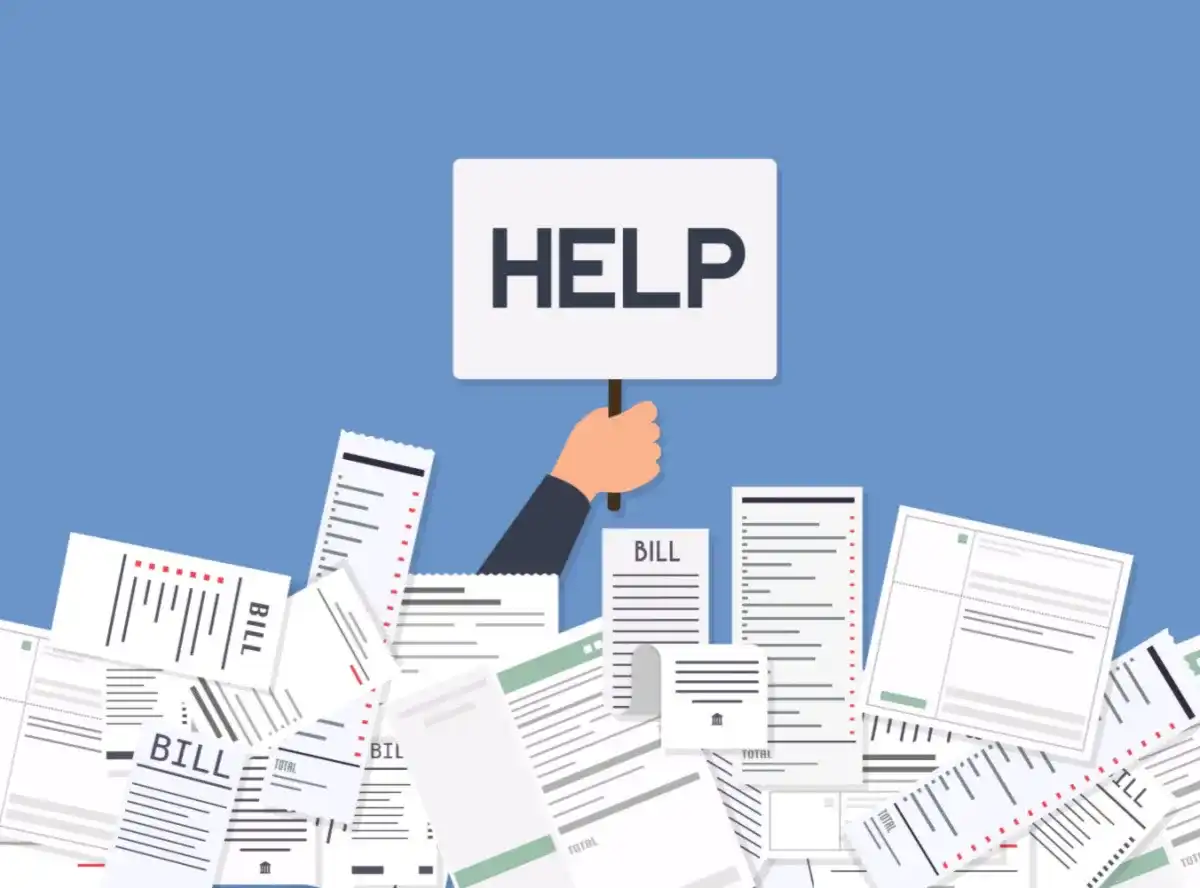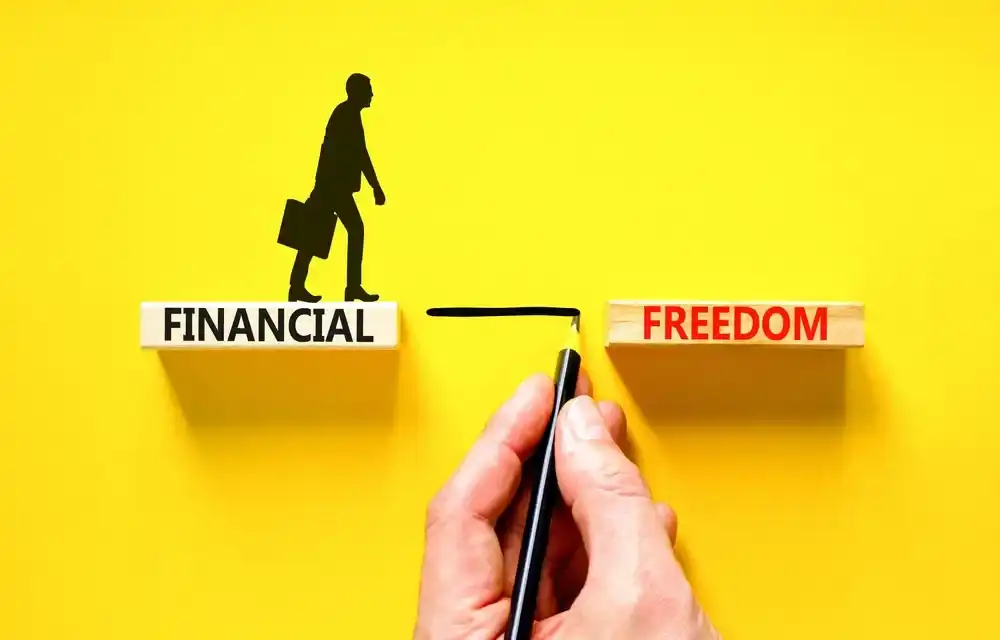Conquer Financial Anxiety and Take Control of Your Money Mindset
In the most recent CNBC Your Money Survey, conducted among 4,000 U.S. adults, an alarming 74% of working Americans revealed heightened stress about their personal finances. This figure, slightly surpassing the previous survey's 70%, shows the escalating financial anxiety prevalent in our society.
Additionally, the survey discovered that 61% of Americans now perceive themselves as "living paycheck to paycheck," a notable increase from the 58% reported just months ago in March. These findings underscore the urgent need to address and conquer financial anxiety, a pervasive concern affecting a significant portion of the population.

How to Overcome Financial Anxiety: Strategies for a Healthier Financial Future
Financial anxiety, often referred to as money anxiety, is the unsettling worry surrounding one's financial situation, encompassing income, job security, debts, and the ability to meet both essential and non-essential needs. The significance of addressing this anxiety is huge, as its symptoms extend beyond personal finance.
Individuals grappling with financial stress may experience difficulties sleeping, heightened emotions such as anger and fear, mood swings, fatigue, and even physical manifestations like aches and pains. Withdrawal from social interactions is also common.
Left unattended, financial anxiety can catalyze a domino effect, resulting in relationship strains, physical health issues, and mental health challenges such as depression or anxiety. A SunTrust Bank survey conducted by Harris Poll highlights the interconnectedness of finance and relationships, revealing that 35% of respondents attribute relationship stress to financial concerns.
Unsurprisingly, debt is often the epicenter of these financial struggles for many couples. Recognizing and addressing financial anxiety is not merely about managing money but is a crucial step towards fostering overall well-being, both individually and within personal relationships. Minimizing the impact of financial stress involves prioritizing mental and physical health, and seeking support from loved ones or professionals when needed.
Recognize the Signs of Financial Anxiety
Understanding the sources of financial stress is the key to addressing and overcoming financial anxiety. Identifying these stressors is the first step toward creating a strategy for a healthier financial future.
Here are some common sources of financial stress:
Lack of Stable Income
Approximately 50 million Americans live in households with incomes below 125% of the poverty line, a threshold encompassing over 15 million children. In 2022, this translated to annual incomes falling below $34,500 for a family of four or $17,500 for an individual.
Various factors can contribute to an unstable income, ranging from job insecurity and fluctuations in the gig economy to economic downturns that lead to layoffs. Unpredictable work schedules, insufficient job opportunities, and limited access to well-paying employment can further compound the challenge of maintaining a stable income.
For those on the lower end of the income spectrum, these uncertainties can create a constant state of financial stress, making it difficult to plan for the future or absorb unexpected expenses. Addressing the root causes of income instability is essential in empowering individuals to break free from the cycle of financial anxiety and work towards a more secure financial footing.
The Recession or Unemployment
In a CNBC Your Money Financial Confidence Survey, 70% of Americans express heightened stress about their personal finances, with 52% noting an increase since the onset of the Covid-19 pandemic in March 2020. Basic household expenses, such as rent, groceries, and utilities, have surged in the past year, diminishing consumers' purchasing power.
According to the survey of 4,336 adults, conducted in March, nearly 60% attribute their financial stress to inflation, followed by economy-wide instability (43%), rising interest rates (36%), and a lack of savings (35%).
These challenges persist despite the current unemployment rate standing at 3.9%, only marginally different from rates in 2022. Despite this seemingly low unemployment rate, a visit to LinkedIn reveals a contrasting reality, with numerous professionals facing joblessness, emphasizing the personal impact of economic fluctuations on individuals' lives.
High Mortgage or Rent Payments
The Council for Community and Economic Research (C2ER)'s 2022 Annual Cost of Living Index reveals that the national average monthly mortgage payment is $1,768, distinct from the U.S. median of $1,532. These figures highlight the substantial financial commitment associated with homeownership.
In the rental landscape, August 2023 data from Apartment List indicates an average national rent price of $1,372. As housing costs continue to rise, individuals and families face the ongoing challenge of allocating a significant portion of their income to maintain a roof over their heads, contributing significantly to financial stress.
Paying for Children's Education
The pursuit of education comes with a hefty price tag. The average cost of attending a public 4-year in-state institution for on-campus living is $26,027 per year or $104,108 over four years. Out-of-state students pay $27,091 annually or $108,364 over four years. Private, nonprofit university students face even steeper costs at $55,840 per year or $223,360 over four years.
For K-12 education, the average annual tuition among 22,440 private schools is $12,350, reaching $16,144 for private high schools and escalating to $32,825 for private universities. Costs at elite boarding schools can soar above $60,000 annually.
These substantial expenses, coupled with the desire to provide quality education for children, contribute significantly to the financial anxiety experienced by parents and guardians, adding another layer of stress to their financial well-being.
Lack of an Emergency Fund
In Bankrate's Annual Emergency Fund Report, a significant 68% of individuals express concerns about covering living expenses for a single month in the event of primary income loss. Moreover, 57% of U.S. adults lack the financial buffer to handle a $1,000 emergency expense without financial strain.
The pressing question arises: how much should one set aside in an emergency fund? There's no universal answer, and diverse perspectives abound. At Cash Store, we recommend stashing away a cushion equivalent to at least three to six months' worth of living expenses.
Living Outside Your Means
Living outside one's means is a prevalent challenge, and 72% of Americans have expressed financial insecurity in a recent Bankrate survey. Over a quarter believe they may never achieve financial security. This unease is amplified by a common trend: many Americans spend beyond their means, utilizing credit cards and loans for purchases beyond their financial capacity. For instance, if one earns $30,000 annually, spending $33,000 and accruing a $3,000 credit card balance is not uncommon.
Compounding the issue, numerous American families do not adhere to the 50/20/30 rule, which suggests 50% of income for necessities, 20% for savings, and 30% for discretionary spending. This lack of financial discipline contributes to ongoing financial stress.
Lack of Financial Preparation for Retirement
Insufficient financial preparation for retirement is a widespread concern. T. Rowe Price recommends saving at least 15% of your income per year, including employer contributions and suggests higher earners aim beyond this threshold.
For a concrete target, having one to one-and-a-half times your income saved by age 35 is deemed reasonable. This aligns well with the 50/20/30 principle, allowing room to allocate funds to an emergency or rainy day fund. Adequate retirement savings ensure financial security in later years and minimize anxiety about the future, fostering a more robust financial foundation.
Growing Personal Debt
According to Experian, the average total consumer household debt in 2023 has surged to $103,358, marking an 11% increase from the $92,727 reported in 2020. This upward trajectory in debt levels is a significant financial challenge for many individuals and families.
As personal debt accumulates, the weight of repayment obligations can lead to heightened financial stress, impacting overall well-being and creating a challenging cycle to break. Recognizing the specific factors contributing to personal debt and formulating a targeted plan to manage and reduce it is crucial in mitigating the associated anxiety and building a more financially secure future.

Assess Your Financial Situation
Creating a financial baseline is key to navigating your economic landscape. The 50/20/30 rule provides a practical framework: allocate 50% of income to necessities, 20% to savings, and 30% to discretionary spending.
Let's consider the financial scenarios below based on your net income.
$50,000 Income Scenario
- Necessities: $25,000
- Savings (after tax): $8,000
- Discretionary Spending: $12,000
$100,000 Income Scenario
- Necessities: $50,000
- Savings (after tax): $16,000
- Discretionary Spending: $24,000
The Consumer Financial Protection Bureau's toolkit is invaluable to assess your financial standing. It facilitates money conversations, aids in goal setting, and addresses challenges. The toolkit empowers individuals to make informed decisions about spending, credit, debt repayment, and overall financial management, ensuring a comprehensive approach to financial well-being.

Practical Steps to Manage Financial Anxiety
Getting on top of financial anxiety is paramount for overall well-being. Unchecked financial stress can have profound long-term effects, contributing to physical ailments such as headaches, gastrointestinal problems, diabetes, high blood pressure, and heart disease.
The toll on mental health (which we’ll discuss further in the next section) includes heightened risks of depression and anxiety. It's not just about dollars and cents; it's about preserving your health and peace of mind.
Here are practical steps to manage financial anxiety:
- Budgeting as a Stress Reliever: Create a realistic budget to gain control over your finances. Allocate funds to necessities, savings, and discretionary spending, adhering to the 50/20/30 rule.
- Building an Emergency Fund: Save at least three to six months' worth of living expenses. This financial cushion provides security in times of unexpected expenses, reducing anxiety about the unknown.
- Debt Management Strategies: Develop a plan to tackle existing debts. Prioritize high-interest debts, explore debt consolidation options, and negotiate with creditors. Taking active steps to manage and reduce debt can alleviate a significant source of financial stress.
By incorporating these steps into your financial routine, you gain control over your money and pave the way for lasting financial well-being, mitigating the physical and mental toll of unaddressed financial anxiety.
Mental Health Strategies
As we’ve said, the weight of financial concerns can cast a dark shadow on various aspects of your life, affecting sleep, self-esteem, and energy levels. Money worries may induce feelings of anger, shame, and fear, straining relationships and escalating pain and mood swings. Left unaddressed, financial stress can heighten the risk of depression and anxiety.
Here are five strategies to protect your mental health amidst financial challenges:
- Mindfulness Techniques: Practice mindfulness through meditation or deep-breathing exercises to alleviate stress and foster a calmer mindset.
- Get More Exercise: Physical activity is a powerful stress reliever. Regular exercise can enhance your mood and boost overall mental resilience.
- Adopt a Healthier Diet: Eating well contributes to both physical and mental well-being. A balanced diet can positively impact your energy levels and mood.
- Engage in Inexpensive Hobbies: Dedicate time to activities you enjoy. Whether it's reading, gardening, or any hobby, it provides a constructive outlet for stress and adds joy to your life.
- Seeking Professional Help: Don't hesitate to consult with a financial advisor or mental health professional to gain insights and strategies for managing both your finances and mental well-being.

Planning for the Future
Building wealth through savings is the cornerstone of a robust wealth planning strategy.
- Create an Emergency Fund: Safeguard against unexpected financial emergencies by setting aside three to six months' living expenses in an easily accessible savings account.
- Reduce Debt: Prioritize paying off high-interest debt, freeing up more funds for savings and investments.
- Set Specific Financial Goals: Clearly define your aspirations, whether it's living debt-free, funding education, starting a business, or improving your credit score. Concrete goals guide your wealth-planning journey.
- Establish a Retirement Savings Plan: Start saving early for retirement, utilizing tax-advantaged accounts like 401(k)s and IRAs. Consider contributing enough to maximize employer-matching contributions.
- Invest Wisely: After creating an emergency fund and reducing high-interest debt, explore investment options aligned with your risk tolerance and financial goals to grow your wealth further.
Strategic financial moves, including smart savings, debt reduction, and informed investments, lay the groundwork for long-term financial stability and prosperity.
Tackling Financial Anxiety: A Blueprint for Financial Well-Being
In a world where financial stress can significantly impact mental and physical health, understanding how to overcome financial anxiety becomes pivotal. Managing financial stress, improving financial health, and adopting effective money management tips are key components of a comprehensive strategy for reducing financial worry.
Through practical steps such as budgeting, building emergency funds, and debt management, individuals can proactively engage in financial planning, creating a pathway toward lasting financial well-being.
Empower Your Financial Future
The journey to overcoming financial anxiety starts with a commitment to manage stress and enhance financial health. Individuals can take charge of their financial narrative by implementing the outlined strategies, from creating realistic budgets to establishing emergency funds and wisely investing.
Reducing financial worry requires thoughtful planning, and the steps we have shared provide a roadmap for building a secure and prosperous financial future. Don't let financial anxiety hold you back; empower yourself with these actionable insights and take the first steps towards a brighter financial tomorrow.
The content on this page provides general consumer information or tips. It is not financial advice or guidance. Each person’s circumstances are unique. The Cash Store may update this information periodically. This information may also include links or references to third-party resources or content. We do not endorse the third-party or guarantee the accuracy of this third-party information. There may be other resources that also serve your needs.
More Articles
What to Know About Crypto-Backed Loans
Curious about using your crypto as collateral? Discover how crypto-backed loans work, their benefits, risks, and what to consider before borrowing.
Read More >How Does Installment Loan Approval Work?
Curious about how installment loan approval works? Learn about the key factors lenders consider, the application process, and tips to improve your chances of approval.
Read More >Is it Better to Get an Installment Loan or Line of Credit?
Installment loan or line of credit—which is right for you? Learn the key differences, pros and cons, and how to choose the best option for your financial needs.
Read More >Loan Amount is subject to loan approval. Loan terms and availability may vary by location. Approval rate based on complete applications received across all Cash Store locations. Customers can typically expect to receive loan proceeds in less than 20 minutes; however, processing times may vary. Loans / Advances are provided based on approved credit. Each applicant for credit is evaluated for creditworthiness.
Please see the Licenses and Rates page for additional product details.
Cash Store offers consumer credit products that are generally short-term in nature and not intended for long-term borrowing needs.
In Texas, Cash Store is a Credit Services Organization. Loans are provided by a non-affiliated third-party lender. Please see the Licenses and Rates page for links to Consumer Disclosures and choose the one for the product and amount that most closely relates to your loan request.
Customer Portal residency restrictions apply. Availability of funds may vary by financial institution.

